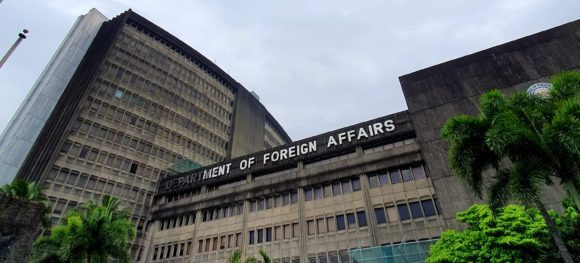My French residence permit expired today without me exercising the option to return to France, extend, or apply for citizenship. This puts a definite closure to a dream I once had of establishing a new and permanent life overseas.
Early this year, guided by a curious set of circumstances, I decided to return to the Philippines to take on a career in the Philippine foreign service. Up until yesterday, in the middle of a hectic workday, I was joking with my colleagues that I still had a few hours to spare and I could actually just pack up, take a spontaneous flight and get into Charles de Gaulle just before the 2nd of December ended and still be allowed entry with my valid card. Of course, I didn’t mean it, and my residence card is now ineffective.
Nanghihinayang ba ako? Short answer, no. Nuanced answer is still a no, but I admit reminiscing and fantasizing once in a while on what my life in France would have been had I stayed, pursued a career in Paris and applied for French citizenship this year. These fantasies recur especially during stressful moments at work and when confronted with the agony of living in Manila at times. But these are only fleeting moments of daydreaming.
Above and beyond this fantasy, I’ve decided that my life is worth more than just the pursuit of personal happiness. I wanted my life to be relevant. I’ve long realized that my life would be meaningful if it was in the service of something greater than myself or my immediate family. Fate did not endow me with the sum of my talents and experiences as Filipino the past three decades to live selfishly and obscurely based solely on my own terms and desires. Happiness, I now believe, follows if I pursue fulfillment first and foremost–beyond the day-to-day desire for personal comfort and delight. The career in the Philippine foreign service offered me a perspective beyond one, two, three years. It offered me the a sense of purpose based on a life of service and a sense of fulfillment with the prospect of unique adventures and challenges I don’t think I could get from any other career.
I can say with all sincerity that I am at peace with my decision, and I am looking forward to a lifelong career as a foreign service officer.
It has been almost four months since I joined the Department of Foreign Affairs. Originally, I planned to publish an entry after my second month, but I became so overwhelmed with office work that I couldn’t even consider pausing to write a proper blog entry. Also, thank goodness my thoughts remained as mental notes. I now realize that many of my initial observations as a new officer are more nuanced than apparent and I would have been embarrassed had I actually posted them without ripened reflection and instructive conversations with more senior colleagues.
Often, I hesitate to even write about my experiences at all this early in the job, consciously avoiding sounding pretentious. But I realize there is value in memorializing some thoughts and feelings for me to look back on years later.
The first observation is that the lives of foreign service officers and staff are very transitory. We are programmed to only stay in the home office three years before deployment to a foreign post for the next six, then be recalled back to Manila for the next three years before another deployment abroad in the next six–until retirement. Such is the regular turnaround of staff that no one normally stays in Manila for more than three years. In the past four months I’ve been with the maritime office, at least four colleagues have left for their foreign assignments. The transition of institutional memory, expertise, and processes is thus always a challenge. I am now increasingly no longer eligible to claim my being new to the job as an excuse not to be familiar with issues and affairs that have been going on for years. But it truly is my most frequent struggle–being expected and demanded to know what I should be doing when I sincerely have barely an idea of what’s supposed to happen or how things are expected to be done. I try my best, but there’s always room for much improvement.
There were weeks when the pressure and expectation were so intense that I entertained the thought of lighting up a cigarette for the first time after almost a decade from quitting, just to grasp at something to calm my nerves. I had to dig deep for motivation as to why I keep up with the demands on some days. Occasionally these feelings get polluted with the regret of what I could be doing right now had I stayed in France and sought employment in a law firm in Paris instead. Eventually I am reminded that this new career is more than just one bad day (or several miserable weeks) at work, and I recall what a boss had said about looking at the national flag to remind oneself of the ideals that made one choose this career.
Officers are made of stern material. Tempered steel does not reach its durability without going through the furnace, so face the heat I will.
My second realization stems from the first. Since many staff and officers’ deployment-and-recall rotations don’t intersect, it is likely that one will rarely or even almost never personally come across colleagues across the foreign service and the only way one will get to know of people (and be known by people) is through one’s reputation passed around by word of mouth in office pantries, group chats, and other social conversations. “Reputation is your currency” illustrates the idea that how people in the Department perceive you will be indicative of one’s fate in the service. This early I’ve been the recipient of many unsolicited stories of others–it makes me very concerned how people will talk about (or have already judged) me as a junior officer.
Among the most consistent pieces of advice I received from colleagues and seniors when I entered the service is to avoid social media–if not quit it altogether. In fact, among the first documents I received on my first day was the Department’s social media policy–which was reasonable. But for someone who has kept a blog and an online presence since 2000 (22 years ago now), this is a challenge because my digital footprint is everywhere. One time I was called out by a colleague because someone in the Department apparently found a tweet distasteful and warned me to be careful. The tweet in question seemed like a benign comment during a workshop I had attended, but it was enough to raise concerns and ring a bell somewhere.
My life is an open book, in this case–an open blog. Part of my reputation is beyond my control, especially those traces of me that have been immortalized in the annals of cached webpages. For things past, I no longer have the time nor the patience to curate what I had posted or written for over two decades–I am who I am, I was who I was, I said what I said–the only way I know is forward and to do better where improvement is necessary.
Having said this, I now knowingly take the risk of publishing these thoughts of a four-month-old FSO trying to navigate his new life in the Philippine foreign service.

The commencement of a possibly lifelong career as a foreign service officer (FSO) merits an inaugural blog entry and a new chapter in this blog. Today marks the first month since I officially assumed my post as FSO in the Philippines’ Department of Foreign Affairs.
As with all career officers who undertake and pass the notorious foreign service exams, our lives as eligible diplomats start with six months of internship and then six months of cadetship, both in Manila. This freshman year of sorts is when we are expected to learn the ways of diplomacy, managing the country’s international relations, advancing its interests abroad, and looking after the well-being of Filipinos around the world.
I have thus been doing my internship with the Department since June 1, which hasn’t been that long at all. I have been detailed with the Maritime and Ocean Affairs Office, which handles the Philippines’ maritime, ocean and archipelagic policies in relation to other countries and international organizations. This includes matters ranging from the country’s maritime borders and territorial claims, to matters relating to ocean governance, shipping, marine scientific research, fishing, etc. For an archipelagic state whose very identity relies on its precise geographic character and its strategic maritime location, these matters are of primordial importance.
